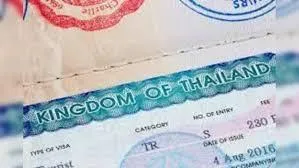Most Recent Blogs

New Thai Visas and Sweeping Changes to Immigration Rules staring June 2024
Introduction:
Are you looking to stay in Thailand a little longer than 30 days? Then we have great news for you! Extended stays in the Kingdom have just become a whole lot easier.
Update (16 july 2024):
We understand there has been a lot of confusion surrounding Thailand's announced visa regulation updates and the introduction of a brand new nomad visa, initially slated to take effect on June 1st, 2024. But then this didn't happen and for over a month, there were no updates or official news, leaving many unsure about the status of these changes.
We're pleased to inform you that the new regulations have finally taken effect as of July 15th, 2024, as officially confirmed by the Thailand Embassy.
Read on to learn more about the changes, detailed requirements, and what this means for your travel plans.

At Baan Suay Bantai, we always keep our guests informed about the latest travel news and updates that could impact your stay in our little slice of paradise. Today, we’re excited to share some significant changes to Thailand's visa and immigration rules, effective from July 15, 2024. These changes are designed to boost tourism and attract professionals, students, and retirees to the Kingdom. Here's everything you need to know about the new visas and updated immigration policies.
The New Destination Thailand Visa for Digital Nomads
Thailand has introduced the all-new Destination Thailand Visa (DTV), catering specifically to digital nomads and remote workers. This visa is a game-changer for those who wish to combine work and travel in Thailand.
Validity: 5 years
Duration of stay: Up to 180 days per year (non-consecutive)
(Financial) Requirement: Proof of at least 500,000 THB in the bank
Work Conditions: No work permit is required; foreign income is untaxed
Eligibility: Applicants must be at least 20 years old
Visa fee: 10,000 THB
This visa makes Thailand an ideal destination for digital nomads, allowing them to enjoy the country’s beautiful landscapes and vibrant culture while working remotely.
Expanded Visa-On-Arrival and Visa Exemption Programs
To further promote tourism, Thailand has expanded its visa-on-arrival and visa exemption programs. 🎉
Here are the key changes:
Visa-On-Arrival: Now available to citizens of 31 countries, up from 19.
Visa Exemption: Extended to 93 countries, up from 57.
New additions to the visa exemption list include:
Albania
Cambodia
Jamaica
Laos
Mexico
Morocco
Panama
Romania
Sri Lanka
Uzbekistan
China, India, and Kazakhstan (now permanent visa-free agreements)
Visitors from these 93 countries (listed below) can now stay in Thailand for up to 60 days without needing a visa, doubling the previous 30-day allowance. The 60 days can also be extended at the Immigration Office for an additional period not exceeding 30 days. This extended stay is expected to encourage longer vacations and increased spending, benefiting the local economy.
The 93 countries eligible for the visa exemption scheme include:
Africa: Mauritius, Morocco, South Africa
Americas: Brazil, Canada, Colombia, Cuba, Dominica, Dominican Republic, Ecuador, Guatemala, Jamaica, Mexico, Panama, Peru, Trinidad and Tobago, United States, Uruguay
East/Central Asia: Bhutan, Brunei, Cambodia, China, Hong Kong, India, Indonesia, Japan, Kazakhstan, Laos, Macao, Malaysia, Maldives, Mongolia, Philippines, Singapore, South Korea, Sri Lanka, Taiwan, Uzbekistan, Vietnam
Europe: Albania, Andorra, Austria, Belgium, Bulgaria, Croatia, Czech Republic, Denmark, Estonia, Finland, France, Georgia, Germany, Greece, Hungary, Iceland, Ireland, Italy, Kosovo, Latvia, Liechtenstein, Lithuania, Luxembourg, Malta, Monaco, Netherlands, Norway, Poland, Portugal, Romania, Russia, San Marino, Slovak Republic, Slovenia, Spain, Sweden, Switzerland, Ukraine, United Kingdom
Middle East: Bahrain, Cyprus, Israel, Jordan, Kuwait, Oman, Qatar, Saudi Arabia, Turkey, United Arab Emirates
Oceania: Australia, Fiji, New Zealand, Papua New Guinea, Tonga
In addition, 3 countries have entered into bilateral agreements with Thailand, allowing foreign nationals to enter under the Thailand visa exemption status at international airports only:
Argentina
Chile
Myanmar
And yes, all the updates mentioned in this blog are now indeed finally in full effect as per 15 July 2024, as also confirmed by the Thai Embassy.
Eased Restrictions for Education and Retirement Visas
Significant updates have also been made to student and retirement visas:
Student Visa Holders:
Foreign students can now remain in Thailand for up to one year after graduation, giving them time to seek employment and contribute to sectors with labor shortages.
Retirement Visa Holders:
Health insurance requirements have been drastically reduced from 3 million THB to 440,000 THB (400,000 for inpatient and 40,000 for outpatient coverage). This change makes the retirement visa more accessible to many applicants.
Boosting Thailand's Economy
These visa reforms aim to rejuvenate Thailand’s economy, which has struggled post-COVID. The government’s target is to attract 40 million foreign tourists in 2024, generating an anticipated revenue of 3.5 trillion THB (approximately $95.3 billion).
Global Trends in Visa Policies
Thailand’s visa changes reflect a global trend towards easing travel restrictions. According to the UN Tourism’s latest Tourism Visa Openness Report, traditional visa requirements are declining worldwide. For example, only 47% of travelers needed a traditional visa in 2023, down from 77% in 2008. This shift is particularly notable in regions like the Middle East and Africa.
By aligning with these global trends, Thailand hopes to attract a more diverse array of visitors, boosting both tourism and long-term stays for various purposes, from business to retirement.
Stay tuned to our blog for future updates on Thai immigration policies and how they can enhance your stay at Baan Suay Bantai. We look forward to welcoming you to our little piece of paradise in Thailand!
*References: TAT News, Siam Legal & Forbes
© 2023+ Misty Dowling Media - All Rights Reserved

